Your dog's coat is their crowning glory, but skin abnormalities can put a damper on things. Dog skin issues can definitely be troubling for pets and pet owners. However, these problems shouldn't get you down. Knowing the most obvious symptoms of common dog skin conditions can help you nip them in the bud ASAP.
In this guide, we'll run through all the red flags that point to skin troubles in dogs. Plus, we'll discuss how to figure out exactly what's wrong and what you can do about it. Let's begin.
Are Dog Skin Issues Common?
Canine skin issues are quite common and can affect dogs of all breeds and ages. Most dogs will likely experience symptoms like intense itching, dry skin, or even hair loss at some point. These problems can stem from various causes, such as food allergies, external parasites, or bacterial skin infections.
If left untreated, these skin abnormalities can lead to bigger problems. Therefore, it's super important to monitor your dog's skin and coat condition and behaviors.
Are Some Breeds More Susceptible to Skin Issues?
That's correct, some breeds are more prone to dog skin conditions than others. Breeds like Bulldogs, Boxers, and Labrador Retrievers often experience skin problems because of their genetic makeup and skin folds. They may suffer from conditions like skin allergies or bacterial infections more often.
Breeds with long hair, such as Shih Tzus and Poodles, are also prone to skin diseases. Their dense coats can trap moisture and create an ideal environment for yeast infections.

What Are the Symptoms of Skin Problems in Dogs?
Symptoms of dog skin problems vary widely but often include obvious signs. The most common ones include:
- Itchy Skin, Redness, and Irritation. These can cause your dog to scratch or lick excessively.
- Excessive Licking, Chewing, or Scratching. These behaviors can lead to acral lick dermatitis or lick granuloma. This condition creates skin lesions that can cause redness, irritation, and infection.
- Hair Loss or Bald Patches. You might see these where your dog has been focusing their scratching.
- Flaky or Scaly Skin. These can indicate dryness or an underlying skin condition.
- Open Sores or Hot Spots (Acute Moist Dermatitis). These are very uncomfortable and can become infected if left untreated.
What Are the Most Common Dog Skin Problems?
Dogs' skin conditions are diverse and affect different parts of their bodies. You're probably most familiar with allergies and irritations. However, there are more things you need to learn. Once you know the most common dog skin conditions, you'll be a step closer to spotting and addressing problems effectively.
In the following sections, we'll discuss some of our canine friends' most frequent skin troubles. Ready? Let's get into it.
Allergy-Related
Dogs may have allergic reactions to certain foods, environmental elements like pollen, or even flea saliva. These allergies often lead to intense itching, redness, and skin irritation. You might notice your dog scratching, biting, or licking a specific area often if they're having an allergic reaction.
In severe cases, your dog's skin can become swollen or develop hot spots (more on this later). To manage these issues, first identify what's causing the reaction and avoid it. Your vet might suggest an antihistamine or topical cream to soothe the skin.

Parasite Problems
Flea and tick infestations can cause serious skin troubles. These tiny parasites bite and feed on your dog's blood, leading to itchy skin and general discomfort. Flea bites can also cause allergic reactions in some pets, leading to more severe itching and irritation.
Watch for signs like frequent scratching, red or inflamed skin, and visible parasites on your dog's coat. Preventive measures like flea collars and topical treatments can help a lot. Plus, regular grooming sessions can help catch infestations early.
Bacterial Infections
This type of skin infection can develop from minor cuts, scrapes, or irritated skin exposed to bacteria. Affected dogs may show symptoms like redness, swelling, and pus-filled sores. Common bacterial skin infections include pyoderma, which often presents as red, itchy bumps or pimples.
Treatment typically involves cleaning the affected area and using topical or oral antibiotics prescribed by a vet. If you have an adventurous pup, be sure their skin stays clean and free from open wounds.

Irritated Hot Spots
Hot spots, also known as acute moist dermatitis, are painful and inflamed areas on a dog's skin. These lesions can develop quickly and can be very uncomfortable. Excessive licking, scratching, or biting due to allergies, insect bites, or underlying skin infections can cause these hot spots.
They appear red, moist, and swollen. They often involve hair loss around the affected area, too. Treatment usually involves cleaning the affected area, applying a topical cream, and preventing licking or scratching behaviors.
Yeast Infections
A yeast infection often affects a dog's ears, paws, and skin folds, causing great discomfort. These skin infections are usually the result of yeast overgrowth. Yeast is a type of fungus that thrives in warm, moist environments.
Symptoms can include redness, itching, and a distinct, musty odor. Pets with yeast infections might also experience flaky skin and hair loss in the affected areas. Treatment typically involves antifungal shampoos or topical solutions. Maintaining good hygiene and keeping your dog dry can also help.
Ringworm
Despite its name, ringworm isn't caused by a worm but by a group of fungi called dermatophytes. This fungal infection affects a dog's skin, hair, and nails. It is highly contagious and can spread to other pets and even humans.
Symptoms include bald patches, red and scaly skin, and itching. Treatment often requires antifungal medications prescribed by a vet. It's also important to clean and disinfect your dog's living area to prevent the skin infection from spreading.
Dry or Flaky Skin
Many things can cause dry or flaky skin, such as a poor diet, environmental conditions, or an underlying illness. Pets with dry skin often show symptoms like dandruff, itchiness, and a dull coat. This skin condition can cause discomfort and lead to excessive scratching or licking.
To treat dry skin, first figure out the underlying condition causing it and ask your vet for appropriate solutions. A diet rich in essential fatty acids may help. You can also try dog-safe moisturizing shampoos and conditioners. Proper hydration is also key to maintaining healthy skin.

Alopecia (Hair Loss)
Alopecia, or hair loss, can result from various causes, including allergies, hormonal imbalances, or skin infections. Affected dogs may exhibit patchy hair loss, thinning fur, or complete bald spots.
Identifying the cause of alopecia is key for proper treatment. Vets usually recommend tests to determine if the hair loss is due to underlying skin conditions. Solutions can range from dietary changes and supplements to medications.
Skin Cancer
Skin cancer is a serious condition that needs immediate attention. Different skin cancers can affect dogs, including malignant melanoma, squamous cell carcinoma, and mast cell tumors. These types often present as unusual lumps, bumps, or skin tumors. Other symptoms include sores that do not heal and changes in the appearance of existing moles.
If you notice any unusual growths on your dog's skin, consult your vet immediately. Treatment may involve surgery, chemotherapy, or radiation. Regular skin checks can help spot skin cancer early and improve affected pets' chances.
Autoimmune Disease
Autoimmune diseases happen when the body's immune system attacks its own cells. These conditions can manifest as various skin problems, including sores, ulcers, and hair loss. Common autoimmune skin conditions include lupus and pemphigus. These can lead to skin abnormalities and cause great discomfort.
Symptoms can vary but often include redness, blisters, and crusty lesions. A proper diagnosis requires blood tests and skin biopsies. Treatment usually involves medications to suppress the immune system and manage symptoms.
Related Product: Skin, Coat & Nail Soft Chews for Dogs
Dog Skin Problems Preventative Tips
Discussing all those skin problems may have scared you a bit. Fret not — there are steps you can take to support your pup's skin health and possibly prevent those issues from happening. However, remember that for skin diseases, disorders, and serious infections, getting expert veterinary advice is the first thing you should do. Now, let's get into some practical tips and tricks to help keep pesky skin woes at bay.
Proper Diet
A balanced diet rich in essential nutrients helps support a shiny coat and healthy skin. Foods high in omega fatty acids can help improve skin condition. Protein also helps with skin repair and growth. Plus, certain vitamins and minerals can support overall skin health. Consult your vet to create a diet plan that meets your pup's specific needs.
What Food Ingredients Support Dog Skin?
Certain ingredients can help keep your dog's skin clear and their coat vibrant. Consider adding these to your dog's diet:
- Omega-3 and Omega-6 Fatty Acids. Found in fish oil and flaxseed, these help reduce skin irritation and promote a shiny coat.
- Proteins. Chicken, beef, and fish help with skin repair and growth.
- Antioxidants. Vitamins E and C help protect the skin from damage and support the immune system.
- Zinc. This mineral aids in skin healing and overall health.

Skin and Coat Supplements for Dogs
Skin and coat supplements can be a helpful partner in combating dog skin problems. These pet products often contain beneficial ingredients that promote skin and coat health.
HolistaPet's Skin, Coat, & Nail Soft Chews for Dogs is a popular option. These tasty, soft-baked chews are easy to administer and double as treats, making them a perfect addition to your canine pal's wellness routine.
Our winning formula includes essential ingredients like fish oil, aloe vera, ascorbic acid (vitamin C), and biotin. These and other ingredients work together to keep your beloved pet's skin glowing, coat shiny, and nails healthy. Visit our shop for more information.
Regular Baths
Bathing helps remove dirt, allergens, and parasites that can cause problems. Use a gentle, dog-specific shampoo to help prevent dryness and irritation. Remember to bathe your pup at appropriate intervals, as over-bathing can strip natural oils from their skin. Typically, every few weeks is enough, but this can vary based on your dog's breed and lifestyle.
Knowing Your Dog's Breed
Certain breeds are more prone to specific skin conditions due to their genetic makeup, coat type, or skin structure. For example, Bulldogs and Shar-Peis have skin folds that can trap moisture and bacteria, potentially leading to infections. Knowing your dog's breed-specific needs can help you take proactive steps in their skincare routine.
When To Got to the Vet for Dog Skin Conditions?
Pet owners need to be vigilant when caring for their pets' skin. Consult a vet if your pup shows persistent symptoms, such as:
- Severe Itching
- Redness or Swelling
- Sores That Do Not Heal
- Unusual Lumps or Bumps
- Hair loss or Changes in Skin or Coat Appearance
Concerns and Monitoring of Dog Skin Problems
Regularly monitoring your pet's skin condition can help detect and address issues early. Pay attention to changes in their coat, behavior, and overall skin health. Look for the warning signs we listed earlier, as they may indicate underlying problems.
Keeping a close eye on your pup will allow you to spot potential issues before they become severe. If you notice persistent symptoms, consult your vet ASAP.
Final Thoughts - Dog Skin Issues
Caring for your furry pal's skin isn't just about aesthetics but also about overall health and happiness. Regular monitoring, preventive measures, quality supplements like ours, and timely veterinary care can help your pup avoid serious skin conditions. By becoming a vigilant and proactive pet owner, you can ensure your dog not only looks good but feels good, too!







![Probiotics For Dogs [Soft Chews] - HolistaPet](http://www.holistapet.com/cdn/shop/files/Probiotic-Infographic-1_472d7a29-e30c-435a-9638-1365d8c3a9f9.jpg?v=1725384841&width=104)



























Leave a comment
All comments are moderated before being published.
This site is protected by hCaptcha and the hCaptcha Privacy Policy and Terms of Service apply.